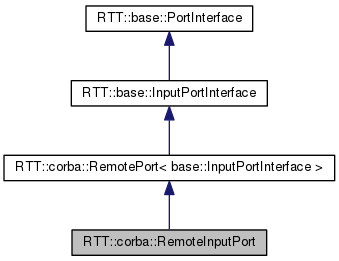#include <RemotePorts.hpp>

Public Member Functions | |
| base::PortInterface * | antiClone () const |
| base::ChannelElementBase::shared_ptr | buildRemoteChannelOutput (base::OutputPortInterface &output_port, types::TypeInfo const *type, base::InputPortInterface &reader_, ConnPolicy const &policy) |
| virtual bool | channelReady (base::ChannelElementBase::shared_ptr channel, ConnPolicy const &policy) |
| base::PortInterface * | clone () const |
| base::DataSourceBase * | getDataSource () |
| RemoteInputPort (types::TypeInfo const *type_info, CDataFlowInterface_ptr dataflow, std::string const &name, PortableServer::POA_ptr poa) | |
Protected Member Functions | |
| virtual bool | addConnection (internal::ConnID *port_id, base::ChannelElementBase::shared_ptr channel_input, ConnPolicy const &policy) |
Private Types | |
| typedef std::map < base::ChannelElementBase *, RTT::corba::CChannelElement_var > | ChannelMap |
Private Attributes | |
| ChannelMap | channel_map |
Detailed Description
Proxy for a remote input port. Since it inherits from ConnFactory, it also allows for building an output endpoint. You can not access its datasource.
Definition at line 123 of file RemotePorts.hpp.
Member Typedef Documentation
typedef std::map<base::ChannelElementBase*,RTT::corba::CChannelElement_var> RTT::corba::RemoteInputPort::ChannelMap [private] |
Definition at line 126 of file RemotePorts.hpp.
Constructor & Destructor Documentation
| RemoteInputPort::RemoteInputPort | ( | types::TypeInfo const * | type_info, |
| CDataFlowInterface_ptr | dataflow, | ||
| std::string const & | name, | ||
| PortableServer::POA_ptr | poa | ||
| ) |
Definition at line 111 of file RemotePorts.cpp.
Member Function Documentation
| virtual bool RTT::corba::RemoteInputPort::addConnection | ( | internal::ConnID * | port_id, |
| base::ChannelElementBase::shared_ptr | channel_input, | ||
| ConnPolicy const & | policy | ||
| ) | [inline, protected, virtual] |
The ConnectionFactory calls this. Overload to do nothing when dealing with remote ports.
- Parameters:
-
port_id channel_input policy
- Returns:
Reimplemented from RTT::corba::RemotePort< base::InputPortInterface >.
Definition at line 136 of file RemotePorts.hpp.
| RTT::base::PortInterface * RemoteInputPort::antiClone | ( | ) | const [virtual] |
Create a local clone of this port with the same name. If this port is a local port, this is an object of the inverse direction (read for write and write for read), and same name. If this object is a remote port, then it is a local port of the inverse direction and with the same name.
Implements RTT::base::PortInterface.
Definition at line 200 of file RemotePorts.cpp.
| RTT::base::ChannelElementBase::shared_ptr RemoteInputPort::buildRemoteChannelOutput | ( | base::OutputPortInterface & | output_port, |
| types::TypeInfo const * | type, | ||
| base::InputPortInterface & | reader_, | ||
| RTT::ConnPolicy const & | policy | ||
| ) | [virtual] |
This method will do more than just building the output half, it will create the two crucial ChannelElements on both sides of the CORBA connection to marshal/demarshal the channel data. The policy is used to determine if storage must be allocated remotely or (has been allocated) locally. reader_ is ignored and must be this.
- Parameters:
-
output_port The local port that will be sending data to the remote channel. type The type of data to transport reader_ Ignored. Must be this. policy The policy for the ConnFactory.
- Returns:
- The local endpoint for the output.
Reimplemented from RTT::base::InputPortInterface.
Definition at line 120 of file RemotePorts.cpp.
| bool RemoteInputPort::channelReady | ( | base::ChannelElementBase::shared_ptr | channel, |
| RTT::ConnPolicy const & | policy | ||
| ) | [virtual] |
For remote input port objects, this is forwarded to the other end over the Data Flow Interface. The given channel must be the output endpoint of a connection, which was built using buildRemoteChannelOutput. So channel->getOutputEndpoint() == channel
- Returns:
Reimplemented from RTT::base::InputPortInterface.
Definition at line 204 of file RemotePorts.cpp.
| RTT::base::PortInterface * RemoteInputPort::clone | ( | ) | const [virtual] |
Create a local clone of this port with the same name. If this port is a local port, this is an object of the same type and same name. If this object is a remote port, then it is a local port of the same type and same name.
Implements RTT::base::PortInterface.
Definition at line 197 of file RemotePorts.cpp.
| RTT::base::DataSourceBase * RemoteInputPort::getDataSource | ( | ) | [virtual] |
Returns a DataSourceBase interface to read this port. The returned data source is always a new object.
Implements RTT::base::InputPortInterface.
Definition at line 117 of file RemotePorts.cpp.
Member Data Documentation
Definition at line 127 of file RemotePorts.hpp.
The documentation for this class was generated from the following files: